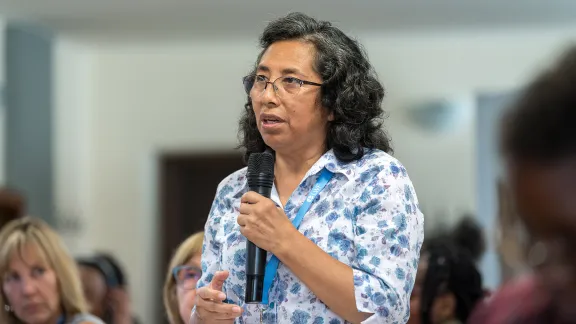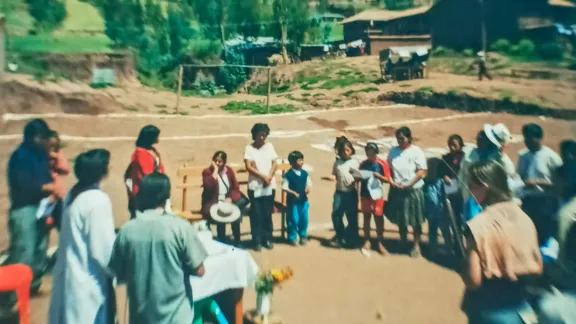In this Voices from the Communion interview, the Pastor President of the Lutheran Church of Peru, Rev. Ofelia Dávila Llimpe, speaks about her ongoing engagement for social and gender justice, the inspiration she drew from Liberation Theology, and her journey to become a pastor.

Rev. Ofelia Dávila Llimpe speaking at the Women’s Pre-Assembly in Wroclaw, Poland, in September 2023. Photo: LWF/Albin Hillert
Voices from the Communion: Rev. Ofelia Dávila Llimpe, Pastor President of the Lutheran Church of Peru
(LWI) – Since May 2023, Rev. Ofelia Dávila Llimpe has been the Pastor President of the Lutheran Church of Peru (IL-P), a church she helped found as a layperson in the Eighties.
She was a The Lutheran World Federation (LWF) Council member from 2017-2023. She also served as a member and later coordinator of the Women and Gender Justice Network for Latin America and the Caribbean for many years.
In this Voices from the Communion interview, Pastora Ofelia, as she is called, speaks about her Catholic roots, the inspiration she drew from Liberation Theology and the Lutheran networks that shaped her mission.
Could you begin by sharing your first religious experiences and what shaped your Lutheran identity?
I come from a Catholic family where faith always had a central place. My father and mother were devout believers, and one of the most vivid memories of my childhood is that they took us to mass on Sundays. I celebrated my first communion in the Catholic church at age ten and briefly served as a Catholic Sunday school catechist during my adolescence.
However, it was important for me to find a place that not only allowed for religious activities but also encouraged contact with other people and offered opportunities for personal and spiritual growth. I discovered that in Liberation Theology, and my close contact with Lutheran friends strengthened my bond with the Lutheran church.
Liberation Theology attracted me because of its focus on social justice and its call to action in view of political and social realities.
How did ecumenical encounters shape your perspective on spirituality and social engagement?
Participating in ecumenical events and my trip to Nicaragua in 1984 were turning points in my life. During that trip, I had the opportunity to undertake field visits to communities in Managua and Matagalpa, where I learned about the region’s harsh social and political realities. It was an encounter with poverty but also with resistance and the struggle for justice. I met Priest Ernesto Cardenal, a leading figure in Nicaragua’s revolutionary process, who emphasized the importance of service and commitment at the local level. This trip broadened my perspective and strengthened my commitment to social justice and service.
After these enriching experiences, I began my theological studies in 1986. Interestingly, initially, I did not intend to become a pastor. My search for spiritual authenticity took me to Brazil, where I took courses at the Escola Superior de Teologia (EST) of the Evangelical Church of Lutheran Confession in Brazil (IECLB). Then, I went to Argentina to study at the Instituto Superior Evangélico de Estudios Teológicos (ISEDET) of Buenos Aires. In both seminaries, I took courses and studied for a few weeks.
When I returned to Peru, I found a shortage of local leaders in the Lutheran congregations. At that time, I took on pastoral roles and became involved in training local leaders. Together with congregational leaders, I proposed the formation of a National Church. Until then, there were only independent congregations. We worked enthusiastically and managed to get the Lutheran Church of Peru (IL-P) off the ground in 1990, marking a significant change in the dynamics of the communities and the pastoral work of the entire church.
What were the crucial factors in that process?
Until then, we had foreign missionaries leading the congregations. During this crucial stage, we advocated for the training of local leaders, scholarships for theological studies, and the promotion of native leadership. The shortage of local leaders led me to take an active role and focus on education as a powerful tool to transform society from the ground up. And I decided to become a pastor myself. I believe that God was guiding my steps throughout this time.
From 1996 to 2000, I studied theology in São Leopoldo, Brazil. During this period, I reconfirmed my commitment to working with women and other aspects related to gender justice. I returned to Peru with my bachelor’s degree and applied for my vicariate. I was assigned to Pastor Patricia Cuyatti, whom I knew from Brazil.
Where did you serve upon your return to Peru?
On 30 December 2001, I was ordained to the pastoral ministry, and on 5 January 2002, I was installed in Cusco to carry out missionary work. In this task, I could work based on my formation and commitment. I addressed not only theological issues but also practical challenges such as education, gender violence and improving basic services such as housing and drinking water.

During the beginnings of the Talitha Kum congregation, Pastora Ofelia held Sunday services on the soccer grounds in Cusco, Peru, in 2004. Photo: IL-P
I worked on the formation of the Talitha Kum congregation. We started worshipping on a sports field, and by the end of my time as pastor, we had managed to buy land and build our own church.
From January 2013 until October 2021, I was the pastor of the San Juan Camino de Esperanza Congregation in San Juan de Lurigancho district, Lima. In addition, in April 2021, I took over as pastor at Congregación Filadelfia, always emphasizing pastoral work, commitment to gender justice and the search for a theology rooted in the context of my country and region.
In May 2023, I was elected Pastor President of the IL-P.
How do you see your current role, and what is your message to the community?
As the presiding pastor of the church, my current role is to lead with a focus on connecting and collaborating across communities. I consider it crucial to talk with colleagues and accompany places with no pastors. We must motivate our leaders to know that they are not alone. Unity and mutual support are fundamental.
What does it mean to you and your church to be part of the global Lutheran communion?
Until last year, I was very involved in the LWF’s Women and Gender Justice Network for Latin America and the Caribbean, working together with other churches in the region and advocating for women’s rights at an international level, such as the UN’s Commission on the Status of Women (CSW).
I believe that our vision should always go beyond the boundaries of our church and focus on genuine and committed leadership. In this way, we can aspire to have a connected church and develop strategic plans that adapt to today’s complex reality.
The Lutheran World Federation is a global body that shares the work and love of Christ in the world. In this series, we profile church leaders and staff as they discuss topical issues and set out ideas for building peace and justice in the world, ensuring the churches and communion grow in witness and strength.


